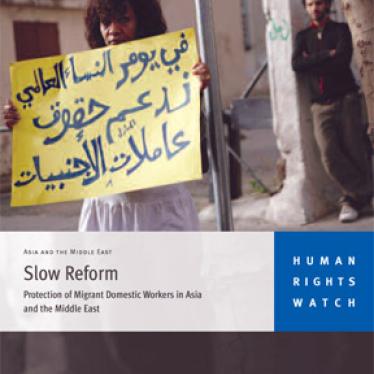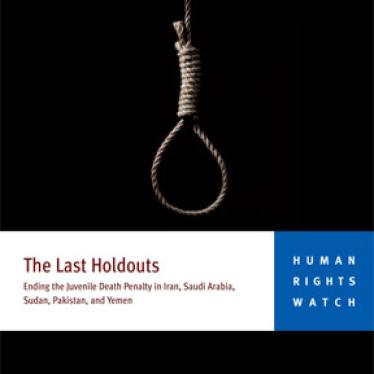(New York) - King Abdullah and Interior Minister Prince Naif should halt the execution of Rizana Nafeek, a Sri Lankan domestic worker convicted of killing a child in her care when she was 17, Human Rights Watch said today. Saudi Arabia is one of only three countries worldwide known to have executed individuals in the past two years for crimes committed when they were children.
Rizana Nafeek had been in Saudi Arabia for two weeks in May 2005, working for the ‘Utaibi family, when their 4-month-old baby died in her care. A recruitment agency in Sri Lanka had altered the birth date on her passport to suggest she was 23 so she could migrate for work, but her birth certificate later confirmed she was 17 at the time.
"There is no dispute that the events happened when Nafeek was a child," said Nisha Varia, senior women's rights researcher at Human Rights Watch. "The Saudi government should not compound one tragedy with another. It's time for Saudi Arabia to end its outlier status as one of the very few countries still executing people for crimes they are accused of committing as children."
An official with the Sri Lankan embassy told Human Rights Watch that diplomats learned last week that Saudi Arabia's Supreme Court had upheld Nafeek's conviction and sentence. A social worker who visited Nafeek in prison on October 24, 2010, told Human Rights Watch that Nafeek is still unaware of the latest Supreme Court decision and is anxious to return home.
Past Human Rights Watch interviews with embassy officials and reporting from Arab News have raised concerns about Nafeek's access to lawyers and competent translators during her interrogation and trial. Though she was arrested in 2005, she did not have access to legal counsel until after a court in Dawadmi sentenced her to death in 2007. Nafeek has also retracted a confession that she said was made under duress, and says that the baby died in a choking accident while drinking from a bottle.
With the Supreme Court's latest decision, judicial remedies have been exhausted, unless it can be shown that the courts falsely interpreted Islamic law in their rulings or new evidence comes to light. The king and interior minister must sign execution orders, however, and no one may be executed without such approval. A senior official in the Sri Lankan embassy told Human Rights Watch that it has requested a meeting with the Interior Ministry.
Under the concept of retaliation (qisas) governing murder cases in Saudi Arabia, the parents of the baby also may seek blood money in compensation or grant a pardon instead of opting to ask the state to execute Nafeek.
"The Saudi government should meet with the ‘Utaibi family, the Sri Lankan authorities, and other relevant parties to leave no stone unturned in efforts to overturn this death sentence," Varia said.
Saudi Arabia is a state party to the Convention on the Rights of the Child (CRC), which expressly prohibits the death penalty or life sentences without parole for offenses committed before the accused turned 18. Nevertheless, Saudi law gives judges wide discretion to treat children as adults in criminal cases, and courts have imposed death sentences on children as young as 13.
Human Rights Watch opposes the death penalty in all circumstances because of its inherent cruelty and its finality. In 2009, Saudi Arabia executed more than 53 persons, including at least three individuals for crimes they allegedly committed as children.








